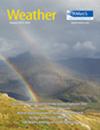研究 2024 年 1 月 28 日英国一月最高气温新纪录背后的因素
IF 1.9
4区 地球科学
Q3 METEOROLOGY & ATMOSPHERIC SCIENCES
引用次数: 0
摘要
2024 年 1 月 28 日,大尺度下沉和通过压缩产生的相关绝热升温使得异常温和的空气在低海拔地区到达苏格兰西部。随后,明显的气流效应将这一气团混合到苏格兰高地的边界层中,来自阿奇法里的官方观测数据记录了英国 1 月份 19.9°C 的新最高气温。观测数据和一些数值天气预报数据被用来评估各种 foehn 机制对这一事件的可能贡献,结果表明机械混合/湍流最有可能发挥主导作用。本文章由计算机程序翻译,如有差异,请以英文原文为准。
Examining the factors behind the new UK January maximum temperature record, 28 January 2024
Large‐scale subsidence and associated adiabatic warming through compression allowed exceptionally mild air to reach western Scotland at low elevations on 28 January 2024. Marked foehn effects were then able to mix this air mass into the boundary layer across the Scottish Highlands, where an official observation from Achfary recorded a new UK January maximum temperature of 19.9°C. Observations and some numerical weather prediction data were used to assess the likely contributions of various foehn mechanisms to this event, with findings suggesting that mechanical mixing/turbulence most likely played the dominant role.
求助全文
通过发布文献求助,成功后即可免费获取论文全文。
去求助
来源期刊

Weather
METEOROLOGY & ATMOSPHERIC SCIENCES-
CiteScore
2.80
自引率
5.30%
发文量
191
审稿时长
6-12 weeks
期刊介绍:
The aim of Weather is to act as a bridge between the interests of those having a professional and a general interest in the weather, as well as between meteorologists and others working in related sciences such as climatology, hydrology and geography.
Articles and regular features are written for a wide range of readers, from professional meteorologists to amateur weather observers. While technical language and mathematical content are kept to a minimum, Weather also seeks to inform and to give readers an opportunity to update their subject knowledge.
Weather is also the ''house journal'' of the Society and seeks to keep the reader up-to-date with Society news and includes meeting and conference reports, a Readers'' Forum series and occasional Viewpoint articles. Photographs of weather events are an important feature of the journal and the Weather Image feature provides an opportunity to analyse a satellite image or photograph. Weather Log is a summary of the weather of each month by means of meteorological data and weather maps.
 求助内容:
求助内容: 应助结果提醒方式:
应助结果提醒方式:


